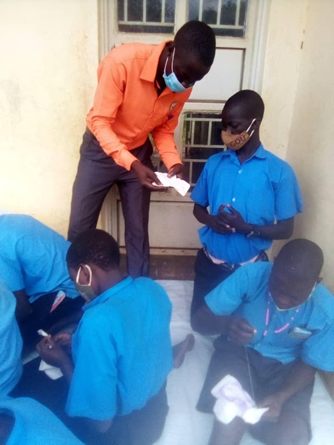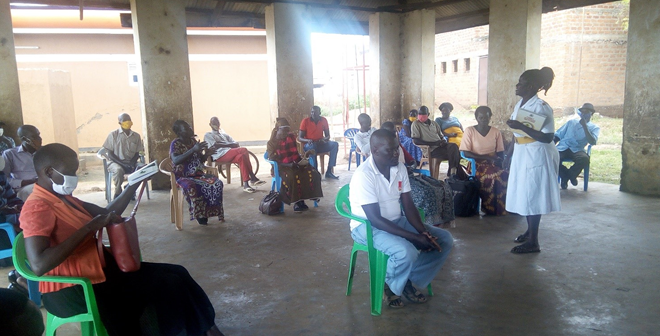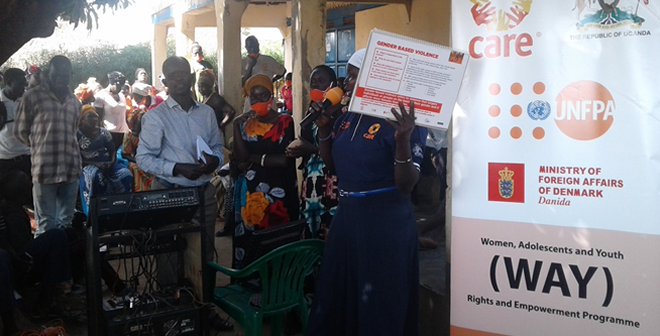How the WAY Programme adapted her interventions amidst the Covid-19 Pandemic
- May 4, 2021
- Posted by: WebAdmin
- Category: News


In 2020, following an unprecedented outbreak of the covid-19 pandemic, the world spun to a stand-still. Countries declared national lock-downs and news headline after headline showed statistics of rising death causing despair, anxiety, unemployment, and hopelessness. In Uganda, government put in place several measures to contain the pandemic including restrictions on mobility and closure of schools and other public institutions which directly affected CARE’s field activities. According to findings from the Rapid Gender Assessment conducted by CARE during the period, women and girls were disproportionately affected, violence was on the rise. Survivors had difficulty accessing Sexual Reproductive Health Rights (SRHR) and Gender Based Violence (GBV) services at health facilities. The closure of institutions and schools left the young people at a loss of protection while women and girls struggled to fend for themselves and their families.
Consequently, the associated social and economic difficulties increased; many started to engage in risky sexual activities resulting in an increased number of reported pregnancies and abortions at health facilities.
In response to the changing contextual issues around the COVID-19 pandemic, CARE International in Uganda’s Women Adolescents and Youth (WAY) rights empowerment programme in partnership with UNFPA and with funding from the Danish Ministry of Foreign Affairs DANIDA- developed key strategies to support field programming. WAY’s major objective is to enhance women’s and youth’s access to and utilization of quality SRHR, and GBV services.
Working with Teachers to remotely reach adolescents around them
CARE devised an Innovative approach of linking teachers from over 461 schools across WAY’s Districts of implementation with 30 pupils each within their locations in order to support adolescents’ access to information on SRHR and GBV with referral for services while away from schools. The approach built on the trained Senior Women teachers who had been identified and trained prior to the outbreak of the pandemic. The curriculum developed for the training included topics on Sexual and Reproductive health, menstrual hygiene, life skills training and leadership. CARE reached out to these teachers remotely (on phone) inquiring about their availability and willingness to continue supporting learners during the Lockdown. Robert Odongkara of Ogako Lacan Primary School in Padibe East sub-county, Lamwo District, is among the teachers who demonstrated self-drive in engaging learners and was motivated when CARE reached out.

Robert supporting some of the learners to make re-usable pads.
“COVID-19 greatly affected the education system but I personally adopted innovative ways of reaching out to learners and continued engaging them from my home in Padibe East sub-county. I would gather pupils of P.4 and P.5 in groups of 30 while observing SOPs, and take them through the mathematics and science learning aids provided by government of Uganda. By the time CARE called me, I was already engaging these leaners and I was encouraged to carry on with what I was doing. I kept on meeting different groups so that they could all benefit from this arrangement. This would also keep me pre-occupied. I would train children from 13-16 years with practical skills in making re-usable pads. The phased re-opening of the education institutions has enabled the functionality of the clubs in schools”. Says Robert.
Likewise, Milly Small, the Senior Woman Teacher of Olya Primary School in Amuru District mentored the adolescents in her community on SRHR and GBV and trained the girls on basic tailoring and making of re-usable pads.

Primary seven girls from Olya Primary school during a counselling session in lockdown.
“The pads are comfortable to use and they do not fall off. We make them using soft cotton, towels and ropes to hold them tight so they do not fall off. Each person makes one suitable for their size. When my mother wanted to marry me off before I could finish school, I joined the club and was helped. Now I even make and give the reusable pads to my mother,” confesses Lakot Prisca, a pupil at Olya Primary school. Through these efforts, Robert, Milly and other teachers were able to connect with adolescents within their community including those from other club schools. As a result, the youth are reported to be more open to discussing and engaging in dialogues around challenges affecting them. Several testimonies and reports indicate that the youth who have been engaged are responsive, responsible within their communities and their esteem has greatly improved.
Justine Apire, a teacher at Juba Road Primary School in Gulu District uses the Village Savings Loans Association (VSLA) approach to attract young people into his group. During their routine weekly meetings, he shares information on SRHR and Gender Based Violence. “There has been tremendous change from my recruits who used to spend most of their time gambling and drinking alcohol,” Reports Justine.
Working with Midwives to integrate SRHR
Through the District Health Departments, CARE was able to involve and engage midwives to support the community structures in the areas of sexual reproductive health and Gender based violence. The midwives worked with structures like women mentors, safe space volunteers, farmer group leaders who were mobilized in small groups in various sub-counties while observing the COVID-19 SOP guidelines.
Grace Layet Loyola, of Namukora sub county in Kitgum District is one of the women mentors who supported two girls from Dog Dem Primary School in Namukora with information on adolescent family planning service and effects of teenage pregnancies. During the lock down, she linked them to Namukora Health Centre IV to access SRHR services.
“I supported these girls through mentorship and we became friends, discussed many things around sexual reproductive issues. They disclosed the fact that they had boyfriends during our sessions on prevention of unwanted pregnancies and family planning methods. As CARE had trained us, after talking to them, I linked them with the midwife at Namukora Health Centre IV where they were able to receive implants. They are now back at school and ready to sit for their P7 (primary leaving examinations)”. Reported Grace.
This engagement bridged information gaps, facilitated a sustainable approach to access and created effective linkage for SRH services by the community structures.

A Midwife facilitating a session on Family planning for Extension worker farmer group leaders
The midwives conducted mentorship sessions on SRHR and GBV with all the platforms and were able to display and illustrate different family planning methods. They shared the Referral pathways for GBV services, clearly guiding on emergency issues that need quick intervention by the health workers to save lives as well as gather forensic evidence before it is distorted within a specified period of time. Midwives also provided guidance counseling and support especially where there were issues around denial of spouses by their partner, myths associated with Family planning services, teenage pregnancies among others.
“We organized three antenatal mentorship sessions a week that saw three to five pregnant teenagers aged 14 to 17 attend. Most of the people in my community have serious misunderstandings towards family planning. They think that if one follows these methods, they may not be able to have children in the future. Infact others think that abortion is the only way forward yet it is illegal in Uganda. Being young and unprepared to carry a pregnancy, the teenagers are counselled and encouraged to spread word in their communities about SRHR and GBV. Under CARE’s program, my roles involved educating other mentor teachers within the community, having meetings with parents to enlighten them too, as well as mentor women, girls and willing men,” Reports Helen Achan, a midwife at Patongo Health Centre III.
These activities were integrated with COVID-19 prevention and management messages, and provided guidance for referral enhanced by observing the Ministry of Health COVID-19 SOPs, routine testing, use of telecommunications (phone call monitoring), working with group focal points and smaller numbers, road drives and the use of public address systems and radio talk shows including COVID-19 support to the district, participation and involvement in the District Task Force Meetings.
The impact of CARE's engagements?
According to CARE’s Gender Justice, Programme Manager, Dr Aramanzan Madanda, engagement of various players has enabled different structures to make informed decisions as far as SRH decisions are concerned. “The engagement of midwives with different community structures such as safe space volunteers, Role model men, Women mentors, and Farmer group leaders greatly enriched our programming as structures were able to listen from midwives, ask questions and responses were provided”. Explains Dr Madanda.

A Mentor sensitizing the community on GBV in Lodonga Sub County – Yumbe District
Through this engagement, there is linkage between the structures and the health facilities in their communities which has enabled the structures to easily access services and support as well as build confidence in the health support system. To enable continuity, the Contacts of midwives and key health facility staffs were shared with the respective platforms to ease linkage and referral for services when a case is identified in the community. Annet Driciru, the senior woman teacher of Dzaipi Secondary School in Adjumani District, identified one of the girls with an abnormal bleeding problem during one of her follow-up visits in her community.
“Her parents had decided to send her away from home because they suspected an abortion, I intervened by referring the girl to Adjumani Health Centre IV where she was diagnosed with a sexually transmitted infection and helpful treatment was given enabling her to fully recover and sit her senior four final examinations.
Rose Amulen, the Initiative Manager for WAY Project says partnering and working together with NURI, the engagement acted as a stimulant to enable the integration of SRH/GBV into livelihood and farmer group activities. “Within one year, 2,060 farmer group leaders and extension workers have been reached and supported. There is evidence of increase in the access of Sexual Reproductive and Health, Maternal and Child Health care services at most health facilities as a result of referrals from the community platforms. The community platforms are also able to follow up on women who have challenges with family planning services and escort them to meet the midwives on appointment without involvement of the CARE team, this gives a strong evidence of sustainability of the program across the 10 districts”. Says Rose.
Due to the knowledge acquired from the midwives on the impact and challenges associated with teenage pregnancies, platforms are now quickly notifying and referring the young girls who are pregnant to the midwives for them to obtain timely support and referral, thus preventing complications. This boosted and strengthened the collaboration between CARE and the District Leadership as well as promoted ownership of the program.
According to the Agago DCDO, Godfrey Ojok, little could be seen during the lockdown however, using the task force with support from CARE, accessing people started slowly. “Accessing services had become difficult but we were able to use the services of the community structures (RMM) where CDOs would meet with them get information making referral and even legal redress. Corona would not stop the community that had knowledge of demanding for their rights. The service providers were reached amidst all challenges. We supported 54 survivors from July 2020- Jan 2021. Interfaced with cultural/religious leaders on issues of managing GBV and responding to issues of SRHR in our community. With the COVID-19 adaptation, we were able to Improve on reporting of GBV cases through sensitisation, record keeping at service points schools, health facilities, CDOs offices, CFPU at police, probation and gender office at the district. Our reporting on the GBVIMS improved from 27% to 52%” Reports Godfrey.
The WAY project covers 11 Districts of West Nile and Acholi-sub regions; Adjumani, Madi-Okollo, Moyo, Obongi, Yumbe and Agago, Amuru, Kitgum, Lamwo respectively, delivering through three key outputs which include;
- Women and young people are empowered to demand their SRHR and gender rights, to foster gender sensitive environments, and to access socio-economic asset building opportunities
- Duty bearers provide integrated and quality SRHR and GBV information and services, which are responsive to the needs of women and young people
- Young leaders are identified and nurtured to develop and implement break-through solutions for the improvement of SRHR and GBV outcomes.
To date, an estimated 1236 women mentors, 1160 girls and women mentees, 2,060 farmer group leaders and extension workers, 1,545 role model men, 824 SASA activists, 103 YSLA agents across 103 sub counties in all the 11 Districts of WAY’s project areas have been reached by the midwives during the review and reflection meetings conducted at sub county level.
Physical Address:
5th Floor, Union House, Plot 78, Luthuli Avenue, Kampala.
Tel: +256 31 2258100
Thank you to all who supported us on this journey, including the untiring colleagues at CARE International in Uganda.


